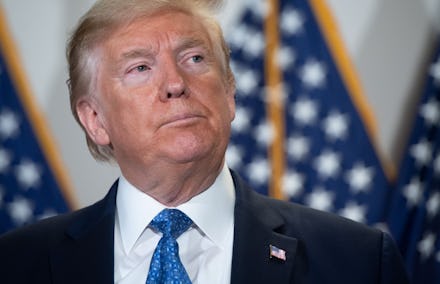The Pentagon spent hundreds of millions for useless mask-washing machines

The coronavirus pandemic has caused a shortage of personal protective equipment like masks for health care workers. Under normal circumstances, the Centers for Disease Control and Prevention says N95 masks should be tossed after one use, but hospitals have been forced to find ways to reuse them. Recently, the Trump administration stepped in with its own solution: a nearly $600 million deal for mask-washing machines, which it turns out don't actually work.
The White House coronavirus task force explored options for mask-washing machines in April. The original deal was supposed to be $60 million for 60 machines, but according to task force notes obtained by NBC News, the Pentagon ended up entering a contract with a minimum cost of $413 million. Now the bill could climb as high as $600 million, the Pentagon projected on May 1.
The machines in question are made by Battelle Memorial Institute, most famous for participating in the Manhattan Project to develop the atomic bomb. Battelle's machines disinfect masks with vapor phase hydrogen peroxide, and the company claims that N95 masks can be washed up to 20 times before being discarded.
But NBC News reported that five days after the deal became public, the National Institute of Health released a study that found the method used by Battelle's machines is only safe for up to three washes. While Battelle tested their product on mannequins, the National Institute of Allergy and Infectious Disease, which carried out the government's study, tried replicating how the masks would fit and wear down on real people.
Health care workers whose hospitals use Battelle's systems have also voiced their concerns to NBC News. One nurse in Connecticut told the outlet, “It’s a fairy tale. It’s being done because we don’t have the policies in place to do what needs to be done, and people are going to be hurt because of it.”
A nurse in Pennsylvania said: “They keep saying these recycled masks are still safe after all these cycles, but we don’t know that. What we do know is that there are not enough masks for medical workers and there are very real consequences if we get sick.”
Like every other frontline medical worker, nurses are struggling to navigate PPE shortages. A survey of 23,000 nurses by National Nurses United, the largest nursing union in the United States, found that 87% have reused single-use personal protective equipment.
The NNU survey also found that 72% of nurses had their skin or clothing exposed while treating coronavirus patients. The NNU told Business Insider that the survey shows "dangerous health care workplace conditions have become the norm since COVID-19 struck the United States."
It is understandable why hospitals and now the federal government are scrambling to address the PPE shortage. But you can't just trade out one dangerous situation for another. And while the deal with Battelle looks well-intentioned on the surface, NBC News reported that it is part of a larger trend of the White House task force rushing to solutions for the sake of giving President Trump a steady stream of deals to announce.
“They’re always swinging for the fences hoping that one time they’ll hit a grand slam” and not worrying if they strike out, one administration official familiar with the work of the task force told NBC News. “They’re gambling that they’ll win one time, and if they don’t they’ll just deflect, which is what we see inside all the time.”
With frontline health care workers being forced to use garbage bags, bandannas, and other non-medical grade items to care for coronavirus patients, it's clear that a solution is desperately needed. But if Battelle's mask-washing machines are only giving the illusion of security, then workers' health is still at risk.